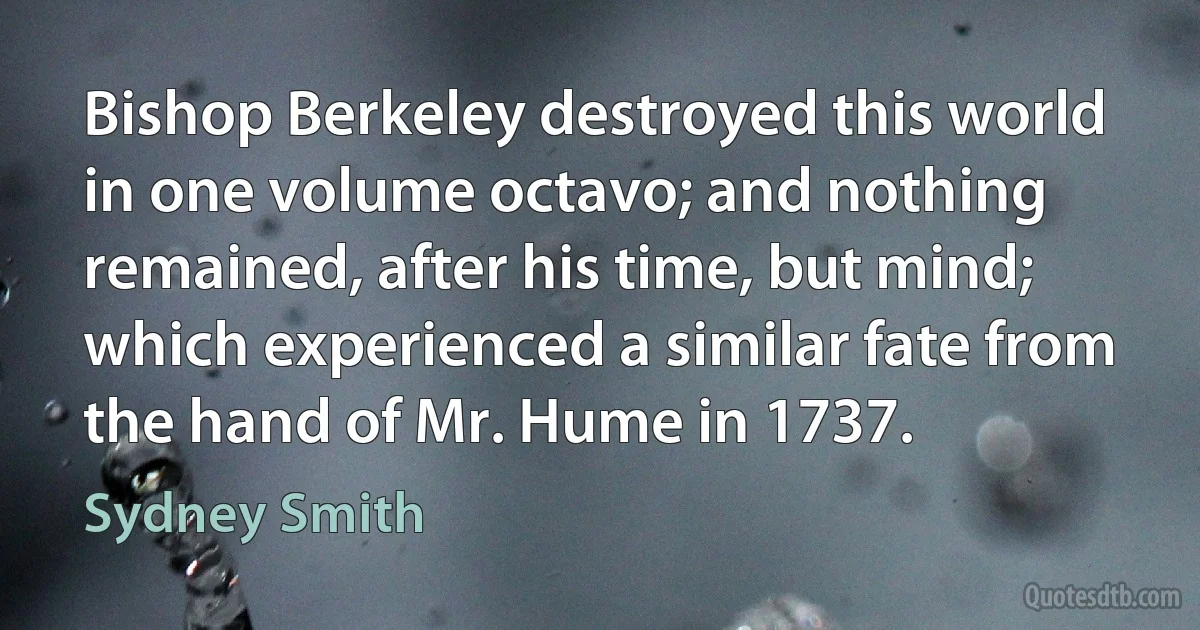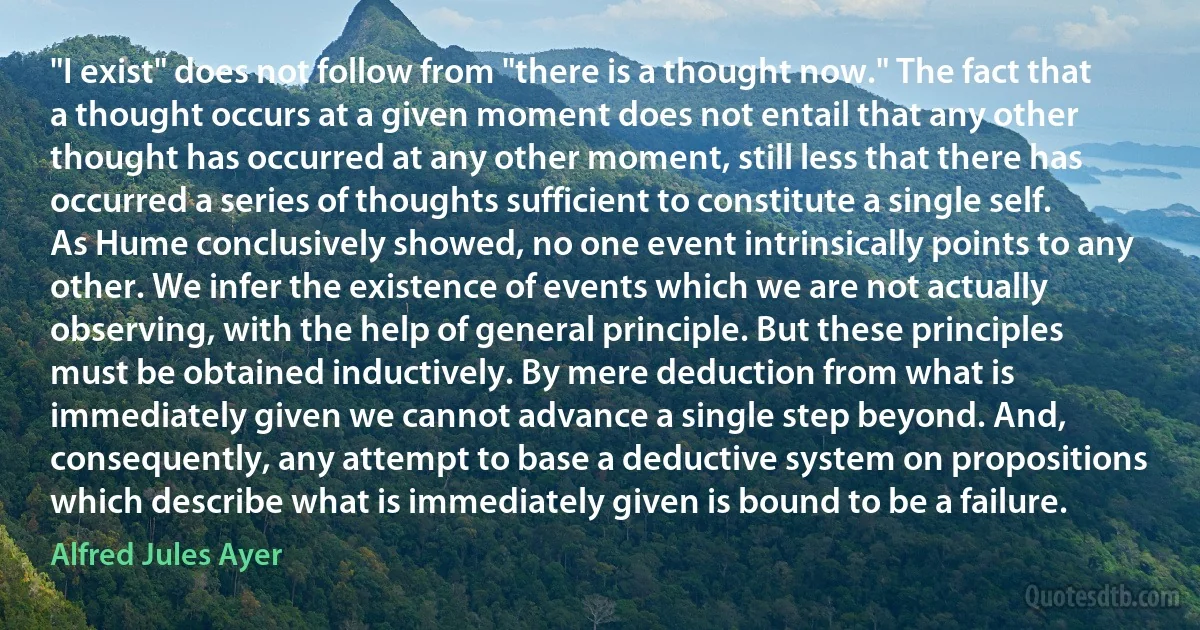Hume Quotes
When Hume and Adam Smith prophesied that a little increase of national debt beyond the then amount of it, would probably occasion bankruptcy; the main cause of their error was the natural one, of not being able to see the vast increase of productive power to which the nation would subsequently obtain.

Thomas Malthus
Acts themselves alone are history, and these are neither the exclusive property of Hume, Gibbon nor Voltaire, Echard, Rapin, Plutarch, nor Herodotus. Tell me the Acts, O historian, and leave me to reason upon them as I please; away with your reasoning and your rubbish. All that is not action is not worth reading.

William Blake
In one of the most brilliant papers in the English language Hume made it clear that what we speak of as 'causality' is nothing more than the phenomenon of repetition. When we mix sulphur with saltpeter and charcoal we always get gunpowder. This is true of every event subsumed by a causal law - in other words, everything which can be called scientific knowledge. "It is custom which rules," Hume said, and in that one sentence undermined both science and philosophy.

Philip K. Dick
What is philosophy? This is a notoriously difficult question. One of the easiest ways of answering it is to say that philosophy is what philosophers do, and then point to the writings of Plato, Aristotle, Descartes, Hume, Kant, Russell, Wittgenstein, Sartre, and other famous philosophers. However, this answer is unlikely to be of much use to you if you are just beginning the subject, as you probably won't have read anything by these writers.

Nigel Warburton
Coleridge observes that all men are born Aristotelians or Platonists. The latter feel that classes, orders, and genres are realities; the former, that they are generalizations. For the latter, language is nothing but an approximative set of symbols; for the former, it is the map of the universe. The Platonist knows that the universe is somehow a cosmos, an order; that order, for the Aristotelian, can be an error or a fiction of our partial knowledge. Across the latitudes and the epochs, the two immortal antagonists change their name and language: one is Parmenides, Plato, Spinoza, Kant, Francis Bradley; the other, Heraclitus, Aristotle, Locke, Hume, William James.

Jorge Luis Borges
One long-past innocent day, in my prefolly youth, I came upon a statement in an undistinguished textbook on psychiatry that, as when Kant read Hume, woke me forever from my garden-of-eden slumber. "The psychotic does not merely think he sees four blue bivalves with floppy wings wandering up the wall; he does see them. An hallucination is not, strictly speaking, manufactured in the brain; it is received by the brain, like any 'real' sense datum, and the patient act in response to this to-him-very-real perception of reality in as logical a way as we do to our sense data. In any way to suppose he only 'thinks he sees it' is to misunderstand totally the experience of psychosis."

Philip K. Dick
Hume describes (E, 235) as a "fancied monster” a man who has "no manner of concern to his fellow-creatures but to regard the happiness and misery of all sensible beings with greater indifference than even two contiguous shades of the same color” (ibid.). To limit one's concern to those sensible beings who are of one's own species is to be part-monster, but such monsters, alas, are not merely fancied ones.

Annette Baier
I think there is at least one moral theory of respectable lineage and good independent credentials that can accommodate such fairly minimal intuitions about us and animals. This is the theory Hume offers us. I do not consider Hume a forerunner of utilitarianism, and therefore what I shall go on to say in defense of Hume is not intended as a defense of any version of utilitarianism. I see Hume to be much closer to Aristotle than to Mill, to be offering us a theory about human virtues, not a theory about utility maximization and the duties that might involve.

Annette Baier
Isaac Newton deserves to be included in a series of companions to major philosophers even though he was not a philosopher in the sense in which Descartes, Locke, and Kant were philosophers. That is, Newton made no direct contributions to epistemology or metaphysics that would warrant his inclusion in the standard list of major philosophers of the seventeenth and eighteenth centuries – Descartes, Spinoza, Locke, Leibniz, Berkeley, Hume, and Kant – or even in a list of other significant philosophers of the era – Bacon, Hobbes, Arnauld, Malebranche, Wolff, and Reid. The contributions to knowledge that made Newton a dominant figure of the last millennium were to science, not to philosophy.

I. Bernard Cohen
Students of the human mind have long noted its ability to mimic internally the positive notions and transformations of objects in the external world. In the middle of the eighteenth century, the British empiricist David Hume wrote that to "join incongruous shapes and appearances costs the imagination no more trouble than to conceive the most natural and familiar objects" and that "this creative power of the mind amounts to no more than the faculty of compounding, transposing, augmenting, or diminishing the materials afforded us by the senses and experience."

Roger Shepard
The literary opposers of Christianity, from Herbert to Hume, have been seldom read. They made some stir in their day: during their span of existence they were noisy and noxious; but like the locusts of the east, which for a while obscure the air, and destroy the verdure, they were soon swept away and forgotten.

William Wilberforce
The not-visibly-insane Democrats all claim they'll get rough with the terrorists, but they can't even face Brit Hume.
In case you missed this profile in Democrat machismo, the Democratic presidential candidates are refusing to participate in a debate hosted by Fox News Channel because the hosts are "biased." But they'll face down Mahmoud Ahmadinejad!
At this, even Hillary Clinton was thinking, "Come on, guys - let's grow a pair."

Ann Coulter
At last I have attained true glory. As I walked through Fleet Street the day before yesterday, I saw a copy of Hume at a bookseller's window with the following label: "Only 2l. 2s. Hume's History of England in eight volumes, highly valuable as an introduction to Macaulay.”.

Thomas Babington Macaulay
Let us be honest. Did all the priests of Rome increase the mental wealth of man as much as Bruno? Did all the priests of France do as great a work for the civilization of the world as Diderot and Voltaire? Did all the ministers of Scotland add as much to the sum of human knowledge as David Hume? Have all the clergymen, monks, friars, ministers, priests, bishops, cardinals and popes, from the day of Pentecost to the last election, done as much for human liberty as Thomas Paine?

Robert G. Ingersoll



